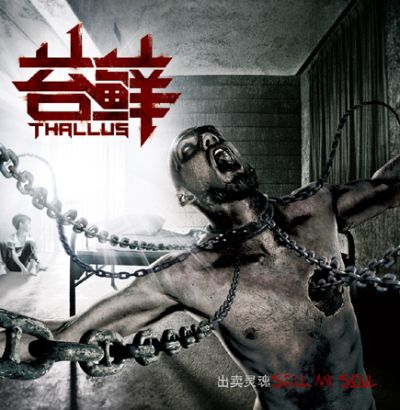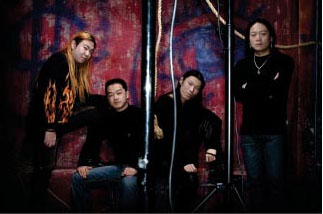Oxymoron is a concept often entertained when hearing the term Melodic Death Metal. It is in some ways fair and just but in other cases just a narrow minded observation of a genre with a rich history. Granted that the Death Metal genre, a breed of music built on its repugnant riffs and equally repugnant subject matter, is not often known for its melody mainly because it has none. But as art is in a state of constant motion this changed, forging Melodic Death Metal attempting to add musicality to a genre that had the musicianship to handle it.
Delving deep into this genre will reveal Thallus and their 2009 album Sell My Soul. The band was first introduced to me under the name Moss with their sublime “Hail to Carcase”. I was initially disappointed whilst studying the track listing to see the song was noticeably absent. But the albums closing track “To Pay Tribute to the Dead” is a reworked version of the aforementioned song. It lacked the originals raw power and like the majority of the album sounded disconcertingly clean. The oxymoronic comparisons return to consciousness when the technically stunning guitar melodies stand side by side with the raspy Max Cavalera-esque vocals, evoking more of a jumbled mess of conflicting styles than a unified and tightly formed band. The transitions between the melodic guitar work and main riffs are rough despite their quality, they stand apart rather than compliment one another.
The bands rhythm section also turns in a varied performance. The drums have a consistently strong sound but are equally mundane. At times they verge on painfully simple such as on track “Depression” the opening sees a reliance on double bass with the song patterned with simple beats before returning to the double bass work. The drums know their place on the album; they provide a powerful sounding undercurrent but fail to break through into anything of great talking point. It allows the guitars to take the place they deserve, stealing the albums praise with their constantly strong work. The bass serves as a close 4 stringed doppelganger to the drums work. But it at times succeeds in breaking through the mould and stuns with flurries of varied bass fills. The bass appears uniform until given its chance, where it stands as an equal to the guitars artistic flair, an unbalance in the album that is ignored with relish.
The albums track titles are a mystery. A mystery caused by the bands Eastern origin. Originating from China and singing in their mother tongue, a bold and respectable move from the band with countless bands choosing to sing in English over their own language. From a clueless Westerner perspective the lyrics are completely lost. The songs titles are the only clue into the songs subject matter. “Purgatory’s Gate” and “To Pay Tribute to the Dead” evoke epic imagery when compared to simple titles such as “Depression”. But the songs are all crafted in the exact same way. No emotion or imagery is built up in the music itself. The songs all have technical brilliancy but lack any feeling that could potentially portray the same thing that the lyrics might do. The lack of imagery in the music makes the language barrier more apparent. The bands power is in their twin guitar lead. The storytelling should be done trough them rather than the vocalist whose voice is distracting in a technically brilliant band.
The band undeniably brings musicality into the Death Metal genre, but it is glaringly apparent that it is far from its origins. The melody stands apart from the heavier sections rather than them being interweaved as equals. Both sections are good, mainly on a technical level but they fail to gel and as a result do no compliment each other. They highlight the oxymoronic problems in the Melodic Death Metal genre. Melody and the furious style of Death Metal is a hard thing to blend. The band has elements of both and does them well, but they do not attempt to take advantage of the unique nature of this hybrid genre. They have the musicality and musicianship but something vital is notably absent.

